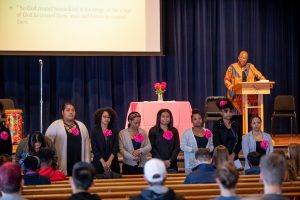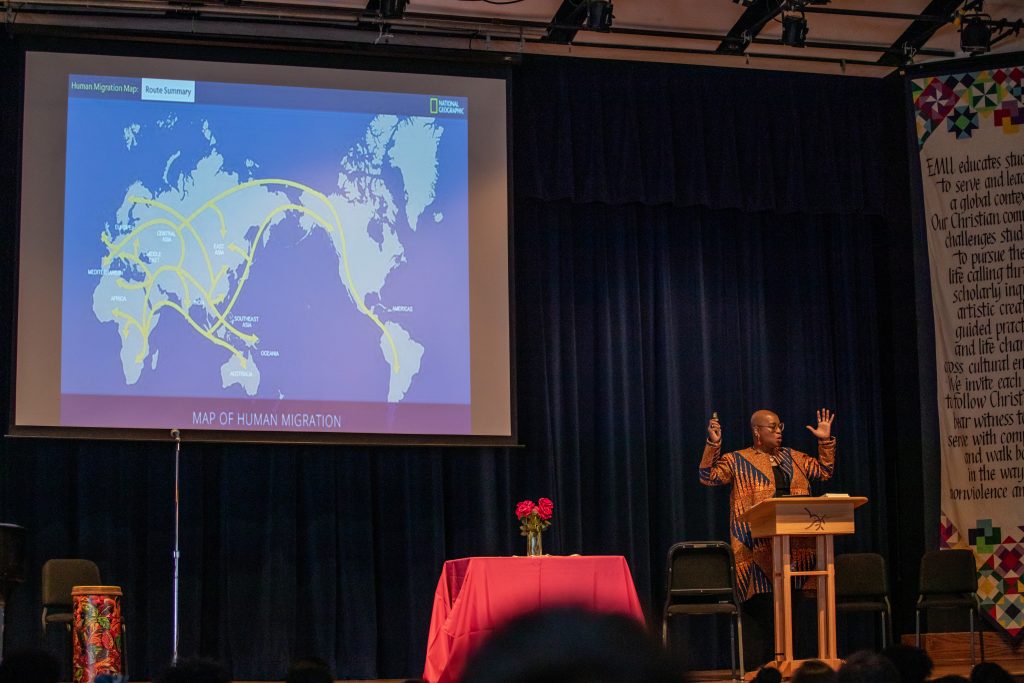The Rev. Dr. Velda Love brought her message of empowerment, truthtelling and biblical understanding to Eastern Mennonite University for three events related to Women’s History Month.
Love is the United Church of Christ’s Minister for Racial Justice, a role she has held since 2017. Now based in Cleveland, Ohio, she formerly taught at North Park Theological Seminary and served for 16 years as North Park University’s director of intercultural justice and learning.

At the Duke Divinity School Summer Institute of Reconciliation, she was a teacher and mentor to EMU social work professor Melody Pannell, who extended the invitation.
In addition to her convocation lecture, Love facilitated two workshops for students with Pannell on womanist theology and “transforming trauma through the restoration of personal identity and resilience of black and brown girls.”
Student members of Destiny’s Daughters, a leadership program and ministry founded and directed by Pannell, hosted Love and participated in the events.
The organization, which takes bright pink as its signature color, empowers girls and women by equipping them to “to recognize historical trauma, address current social disparities and develop resiliency as they engage in spiritual formation, restorative practices and community advocacy.” Besides the EMU student organization, other branches of Destiny’s Daughters are located at Virginia Union University in Richmond, Virginia; Washington D.C. and Harlem, New York.
The events provide “time to celebrate and to speak about some of the tough issues that women are facing today,” said member Jasmine Wilson. “I learned how important it is that I define my own identity, for myself. That is where I will become who God has created me to be. The Rev. Dr. Velda Love was more than just our guest speaker. She is our sister. The messages Destiny’s Daughters shared on campus was for all women on campus and all women around the world. I would invite the campus to join hands with Destiny’s Daughters and our mission to empower and spread love to all.”
One of Love’s themes was that of owning the truth — “deconstructing and decolonizing our history.” This involves not only unearthing buried history related to early human history and Christianity on the African continent, but also laying bare the historic and social constructions of identity.
“The way in which we begin in a beginning is to tell the truth,” she said, reprising some of her points she would share with her seminary students. “As your ancestors came to this land, yours were free and mine were enslaved…their history was interrupted and so there are ways in which we tell the story very differently…This is an important question. Who are your people? And where did they originate from?”
“If we don’t tell the truth about our history, we get it really twisted,” Love said, urging the audience, but particularly members of Destiny’s Daughters, to work towards changing an educational system that values, without question, Western ideologies of racial construction and history.
Similarly, she pointed out, humans do not question their sometimes distorted creations of God — yet God sees all people as his own image, both “fully human and equally equipped.”

I am inspired by your work at telling our black history as it actually was in the past. I will not allow a person from a different racial or ethnic group to define me. I stop other people in their tracks when they talk about “your slave ancestors”. I immediately tell them that my ancestors came from the great continent to a foreign land in which they were “enslaved”. I also say, “do not call my ancestors slaves to make yourselves feel superior.”
I feel sick each week when I have to look at the giant picture of the white man Christ pictured in my church of worship, because I believe that all humans were made in God’s own image and not the way that the Europeans depict him. No minister that I know has even spoken about the 400th Commemoration of the arrival of Africans into North America. My town is celebrating an African American Festival on August 24th and I am determined to see that that is the theme for that festival. I read your article in the Roanoke Tribune, my home town of origin. Thanks for knowledgeable people like you.